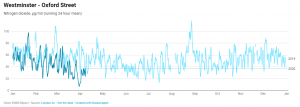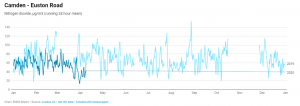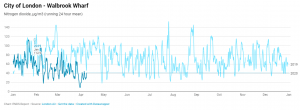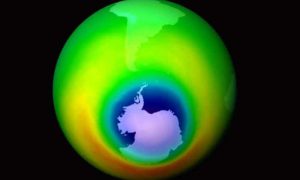Coronavirus Pandemic Leads To Air Pollution Reduction
April 7, 2020
The Coronavirus outbreak made the world ‘stop’. Self-isolation and social distancing orders were put in place in order to stop COVID-19 spread, but they have also remarkably reduced air pollution levels, satellite imagery from the European Space Agency shows.
Governments around the world are making key decisions that aim to stop spreading Coronavirus. For example, London’s air, once full of smog is clearer now due to strict stays at home order issued by UK’s Prime Minister Boris Johnson. According to the BBC News and London Air Quality Network, as a result of the Coronavirus restrictions on people’s movement, average air pollution levels fallen to their lowest since recordings began in 2000. London’s ‘lockdown’ started in late March, and data charts are already showing a significant NO2 reduction on popular high streets.



Harmful emissions include NO2 (Nitrogen dioxide) which is produced by diesel cars, power plants, and many other industrial actions and are prone to worsen illnesses such as asthma, lung cancer, strokes and respiratory disease. Air pollution is also a cause of an estimated 40,000 early deaths in the UK every year.
According to the EEA’s data from the last few weeks show how the accumulation of NO2 have decreased in many Italian cities:
Similar trends can be seen in other European cities where lockdown measures have been implemented during the week of 16-22 March.
Experts say that this situation will not last long. As China is currently registering no new cases of infection, they will soon increase its production to recompensate the losses. Nonetheless, to address long-term wider air pollution problems there’s a need for ambitious and strategic policies with forward-looking investments.
An example of such efforts resulted in reverse southern jet stream ozone damage. Scientists have confirmed that the jet stream appears to have stopped moving south and may be moving back to normal.

The ozone-depleting chemicals are slowly returning back to the southern jet stream because of mutual international cooperation on the matter caused by decades of human disruption. According to The Guardian, the jet stream had been shifting from its natural course until about 2000 affecting storm tracks and rainfall affecting mainly South America, East Africa, and Australia. Chemicals that cause the damage can be found in everyday items such as fridges and aerosols. The harmful chemicals slowly stared to be eliminated in production under the United Nations 1987 Montreal protocol. Only last September, satellite images prove that the ozone hole has decreased in size to 16 sq km, which is the smallest it has been since 1982.
This is a massive success story that proves that there is definitely a way to help heal disrupted climate systems if governments work and act efficiently together. This is also a perfect opportunity for us, people, to rethink our actions and lifestyles.
Why is that important more than ever?
On the 22nd of April, we celebrate the 50th anniversary of Earth Day and the anniversary of the signing of the Paris Agreement to take climate action. Earth Day 2020 calls for 24 hours of environmental involvement from small to big – ‘Civil society organisers hope to fill the world’s digital sphere with global talks, positive acts, performances, and webinars that support urgent action on climate change’ – says UN Environment Programme. People are looking forward and planning for a post Coronavirus recovery – this is a brilliant opportunity for everyone to focus on embracing ‘being green’ for a healthier future – for example, choosing sustainable travel, recycling and reusing to protect ourselves from global warming.
There are many ways to get involved. UN encourages you to join earthday.org live-streamed discussions, events, and actions you can take from wherever you are. Explore the many virtual Earth Day events via this directory to online events across global time zones. There are new tools for volunteering and advocacy and opportunities to participate as citizen scientists–using the Earth Challenge 2020 app to measure data such as air quality and plastic pollution, right where you are.
Source: The Guardian, European Environment Agency, BBC News, Clean Air London, WHO, Ends Report, UN Environment Programme